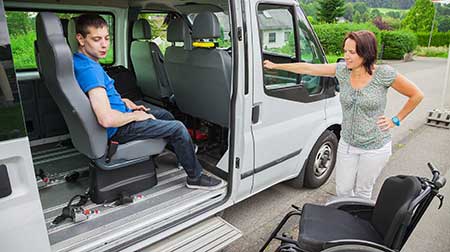School transport routes for children and young people with special educational needs and disabilities (SEND) will not necessarily go to the lowest bidder, councillors have agreed.
They approved an “open bid” retendering process for home to school transport at a meeting of Brighton and Hove City Council’s Policy and Resources Committee at Hove Town Hall.
Councillors were assured that using the “open bid” system would prevent a repeat of the disruption that followed the previous tendering process, with quality to be taken into account.
In September 2019, dozens of students were stranded without transport while others had unsafe or unsuitable transport after providers handed back routes at short notice.
The retendering used a “reverse auction” process which was said to be the main reason for what was described as an “epic failure”.
Companies submitting the lowest bid were awarded routes that they were then unable to serve.
Investigations by the Local Government Association and an independent barrister criticised the council for rushing through a “dynamic purchasing system” (DPS) without councillor oversight.
The service has since been the subject of intense councillor oversight and performance has improved, earning a 95 per cent approval rate with parents and pupils.
But the current arrangements end in August next year – and a procurement project board, with representatives from schools and the Parent Carers’ Council (PaCC), has been meeting since April last year to try to prevent a repeat of the chaos of two and a half years ago.
Councillors were told that choosing an “open bid” system would provide more stability while also allowing for flexibility when needed.
The council’s executive director for families, children and learning Deb Austin told councillors last Thursday (24 March) that retendering was necessary to comply with the law.
And she said, “unfortunately, it is unavoidable that there will be some disruption to the existing arrangement in September 2023, as all new and existing routes must go out to tender.
“We recognise this will likely cause anxiety for parents and their children. It is because the service must comply with procurement legislation.
“The service is working with PaCC and colleagues to explore how disruption at the start of the new contract can be mitigated as much as possible.”
The council has a statutory duty to provide home to school transport for children with SEND.
Ms Austin said that the arrangements that were recommended by officials would help to control costs in a demand-led service.
The annual budget was currently £3.8 million, she said, but it was under pressure because demand was increasing even though school rolls were falling.
Since January 2015, the number of youngsters in the city with an education and health care plan (EHCP) has more than doubled from 1,006 to 2,024 children.
Ms Austin said that other councils were in the same, with demand increasing nationally as more youngsters had autistic spectrum conditions diagnosed.
Green councillor Hannah Clare, who chaired the council’s Homes to School Transport Policy Panel, said that the “dynamic purchasing system” had worked once the council addressed the challenges of 2019.
She said: “We have a full understanding. As someone who chaired the policy panel for quite a long time, we have a real understanding of what went wrong – and why we need to make sure we don’t repeat that.”

Councillor Clare said that supporting young people with independent travel training was a potential long-term cost saver but there were also costs involved with providing travel buddies.
She said that reducing the number of single-passenger routes could also save money although some parents have concerns about the risks and their children’s safety.
The committee was told that there were 68 children who travelled to and from school by themselves, costing more than £5,000 a day in total.
Of those, 39 had “travel alone” status because of their complex needs while 29 children had “solo passenger” status which could change if other pupils were added to their route.
Councillor Clare added: “Of course, our priority is ensuring children are travelling safely to school. Our priority is not the money.”
This academic year the council was supporting 1,149 eligible children and young people to travel to and from school – and of those, 603 were children with additional needs.









